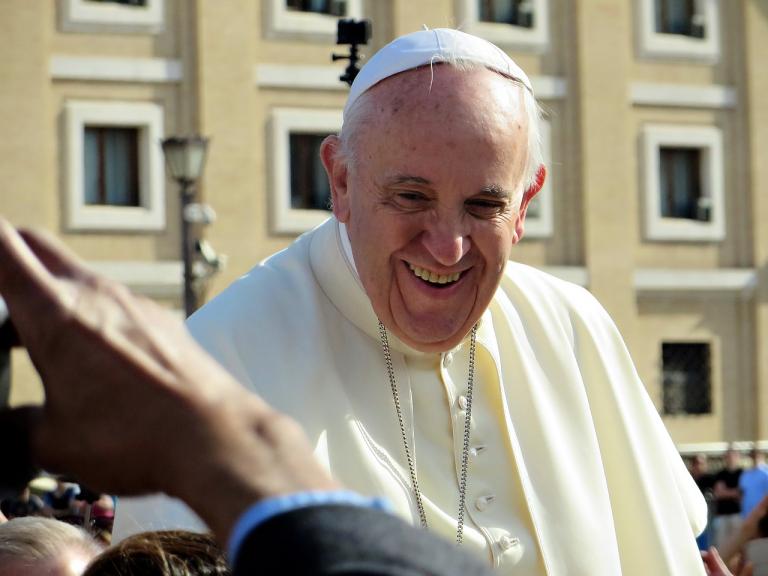A couple of years ago we blogged about how Pope Francis wanted to change the Lord’s Prayer. Well, he has done it, at least for the Italian liturgy. And here we see the problem with the papacy.
The Pope objects to the Sixth Petition: “And lead us not into temptation.” God doesn’t tempt us, the Pope says, so he has had the wording changed to say, “do not let us fall into temptation.”
This is being presented as just a correction of a faulty or misleading translation. But it isn’t! Here is Matthew 6:13 in the original Greek: καὶ μὴ εἰσενέγκῃς ἡμᾶς εἰς πειρασμόν. (Transliterated into our alphabet, kai mē eisenenkēs hēmas eis peirasmon.”) As Joseph Hartropp has pointed out in his discussion of the issue, “The word in contention is the Greek verb eisenenkēs, meaning to ‘lead into’ or ‘bring in’.”
The word for “temptation” does have a semantic range that could make for a different translation. “Peirasmon” can mean “trial” or “testing,” as well as “temptation.” Comments Strong’s Concordance: “temptation or test – both senses can apply simultaneously (depending on the context). The positive sense (“test”) and negative sense (“temptation”) are functions of the context (not merely the words themselves).”
The Latin, which the Pope was working from, is tentatio, a concept familiar to Lutherans, from Luther’s observation that what makes a theologian is oratio (prayer), meditatio (meditation), and tentatio (temptation, trial, struggle, the German Anfechtung that Luther experienced and wrote so much about). (Read John Kleinig’s discussion of this term and the others.)
Thus the Sixth Petition has also been translated “Do not bring us to the time of trial” (NRSV), “Do not bring us to hard testing” (GNT), and the like, and these are legitimate renderings.
Of course, the traditional wording by no means violates James 1:13, which says that God “himself tempts no one.” There is an abundance of commentary that explains this. For example, in Luther’s Small Catechism:
What does this mean? God tempts no one. We pray in this petition that God would guard and keep us so that the devil, the world, and our sinful nature may not deceive us or mislead us into false belief, despair, and other great shame and vice. Although we are attacked by these things, we pray that we may finally overcome them and win the victory.
This is such a wonderful prayer, a plaintive request that we be spared the trials, testing, temptation, and Anfechtung that God does lead us into sometimes, as Scripture and experience show. But by confessing God’s sovereignty, even over the course of these negative spiritual experiences, the petition discloses our faith in the midst of it all, that we are in God’s hands.
The Pope’s version, in contrast–“do not let us fall into temptation”–makes God passive and makes us passive. How do we “fall” into testing? Or trials? Or the spiritual depression of Anfechtung? And if God does let us “fall,” what hope do we have then? Whereas if He is “leading” our lives, through the bad as well as the good, we have an abundance of hope.
What the Pope is doing is neither translating nor interpreting but asserting his authority over that of the text of Scripture.
Catholic theology teaches that its authority is both Scripture and the Magisterium–which “consists of the Pope and Bishops,” though ultimately the Pope. Catholic theology usually claims that there is one revelation from God, which both the Scriptures and the Popes testify to. In particular cases, one locus of authority might reveal one thing and the other locus of authority might reveal another, but they are not supposed to contradict each other. Extra-Biblical teachings such as the Veneration of Mary, Purgatory, and Indulgences rest on the authority of the Pope, but Catholic theologians insist that they are at least hinted at in the Bible. The interpretations might be strained–such as using Esther interceding for her people as a type of Mary–but the attempt is to “save the appearances” by denying any contradiction between Scripture and church teaching.
But Pope Francis, audaciously, is just imposing his authority over Scripture. He doesn’t like what the text says, so he presumes to just change what the text says!
In practice, this is what popes have always done. Their authority trumps that of Scripture. But most popes have maintained that this is not what they are doing. This pope, though, does it openly.
Catholics claim that the institution of the papacy protects the church from constantly changing its teachings due to individual interpretations of Scripture, in contrast, they say, to the multiplication of doctrines they see in Protestantism. This is indeed a problem in Protestantism. Hardly a year goes by without someone claiming that all of Christian history has gotten it wrong, but that now this new teacher can explain what Jesus really meant. (Here is a recent example, seen in a review of The Lost Message of Jesus and The Lost Message of Paul.)
But, rather, the papacy, having an ever-changing sequence of human beings with infallible authority over the church, makes doctrinal innovation possible. And those innovations become required and are institutionalized, becoming a fabric of the church and the piety of the faithful. No one has to believe the individual who claims to have found “the lost message of Jesus.” But all Catholics must believe what the Pope decrees.
In this particular case, not all Catholics have to alter the way they pray the “Our Father.” This change is in the influential Italian liturgy, though a new Italian translation of the Bible also uses the new wording. The wording used in other languages is up to the local bishops. The English-speaking bishops say that changing the English version is not on their to-do list. German speaking bishops have said the same. French bishops are making the change. Presumably, there will be flexibility in devotional practices.
(Read this account from the Catholic News Agency for a detailed account of the nature and the scope of the changes.)
Traditional Catholics are also objecting to the revision. But the whole business encapsulates just why Protestants and the Eastern Orthodox, find the institution of the papacy so problematic.
But here is the biggest problem: These are the words of Jesus! The Pope disagrees with the words of Jesus, so he presumes to correct Him.
I really like Al Mohler’s comment: “This is the Lord’s Prayer. It is not, and has never been, the pope’s prayer, and we have the very words of Jesus in the New Testament. It is those very words that the pope proposes to change. It is not only deeply problematic, it’s almost breathtaking.”
Image by Günther Simmermacher from Pixabay, Pixabay License.

















